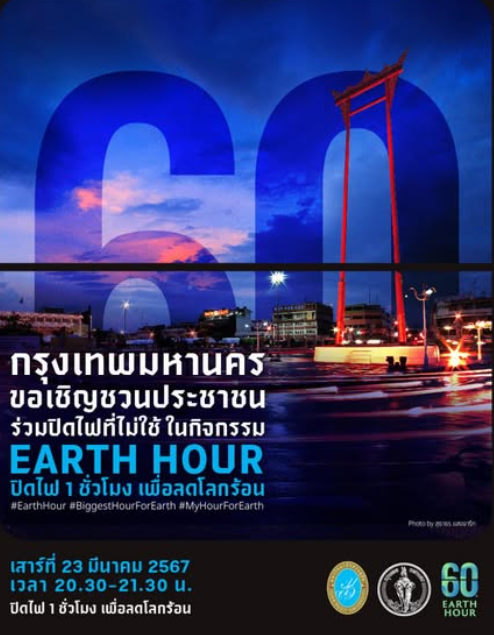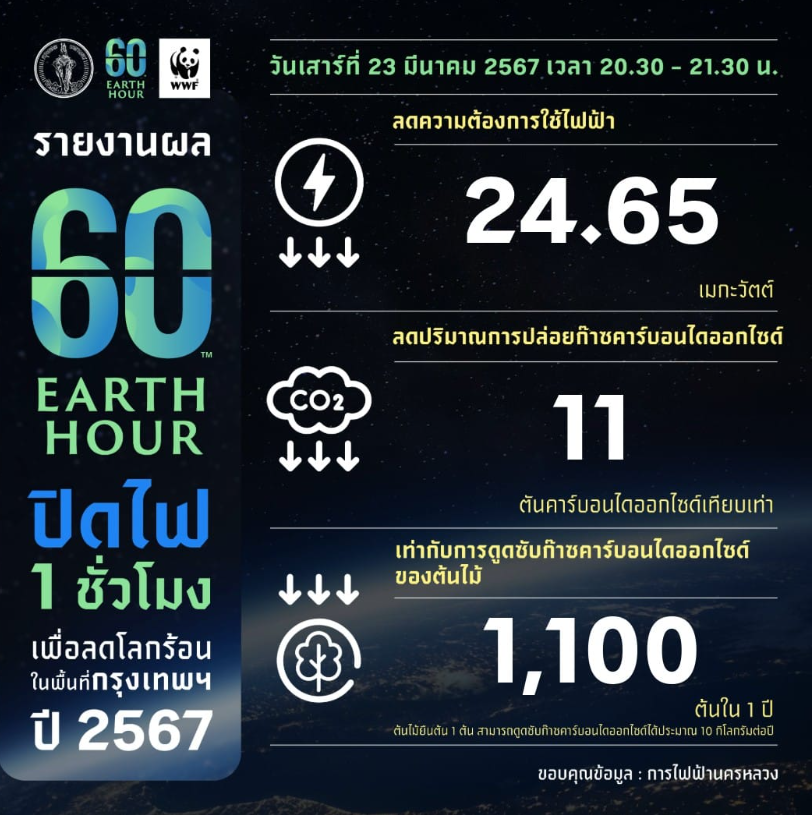Sustainable Development Goal 7 (SDG 7) focuses on ensuring access to affordable, reliable, sustainable, and modern energy for all. Achieving this goal extends beyond producing clean energy—it also encompasses promoting energy efficiency and supporting the development of policies aligned with future-oriented energy technologies.
.
Case Study: Earth Hour 2024 — Building Awareness and Policy Support
Suan Dusit University participated in the “60+ Earth Hour 2024” campaign, organized through the collaboration of the Bangkok Metropolitan Administration (BMA) and the World Wide Fund for Nature (WWF) Thailand, alongside government and private sector networks. The initiative aimed to reduce energy consumption and carbon dioxide emissions—the primary causes of global warming—by engaging communities and contributing to energy policy advocacy at a national level.
The main objective of this campaign was to reduce energy usage by turning off non-essential lights for one hour, in unison with over 7,000 cities across 190 countries worldwide. The campaign encouraged citizens, businesses, and shops to save energy through actions such as turning off decorative lights, building signage, and advertisements, as well as unplugging unused electrical appliances and minimizing air conditioning usage. These behaviors promote alignment with energy-efficient technologies and the broader goal of enhancing energy efficiency.

The Earth Hour campaign is more than a symbolic action — it serves as a vital mechanism for collecting empirical data to inform government agencies about progress in energy efficiency initiatives.
Based on electricity usage data during the one-hour lights-off period (8:30–9:30 p.m.) in Bangkok on Saturday, March 23, 2024, the following outcomes were observed:
- Energy Reduction: The campaign successfully reduced electricity consumption by 24.65 megawatts. This figure provides tangible evidence of the practical impact of energy-saving measures, serving as a key indicator for developing policies related to Demand-Side Energy Management.
- Environmental Impact: The reduction in electricity usage led to a decrease of 11 tons of CO₂ equivalent emissions, demonstrating the direct role of energy-efficient measures in mitigating global warming. Bangkok Metropolitan Administration (BMA) has promoted such efforts since 2008. The reduction achieved is equivalent to the carbon absorption capacity of 1,100 trees in one year.
- Economic Benefits: In addition to the environmental gains, the initiative resulted in electricity cost savings of 130,182 THB, reinforcing the practical value of coordinated energy efficiency actions at both local and policy levels.

Policy Support Through Practical Implementation: The data collected from the reduction of energy use during the Earth Hour campaign not only raised public awareness but also provided policy-supporting evidence for the Bangkok Metropolitan Administration (BMA) to evaluate and expand long-term energy efficiency and clean technology measures. By collaborating with the BMA’s Environment Department, Suan Dusit University and its partner networks contributed directly to government efforts in driving evidence-based policy development aimed at reducing energy consumption efficiently and sustainably. This focus on reducing energy use and enhancing energy efficiency across all sectors forms the foundation for Thailand’s transition toward clean energy technologies, aligning with the nation’s sustainable development goals and climate action commitments.
